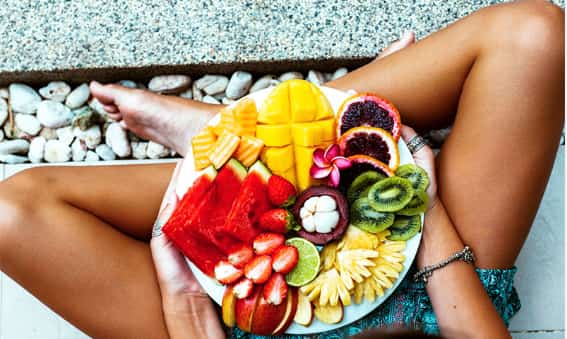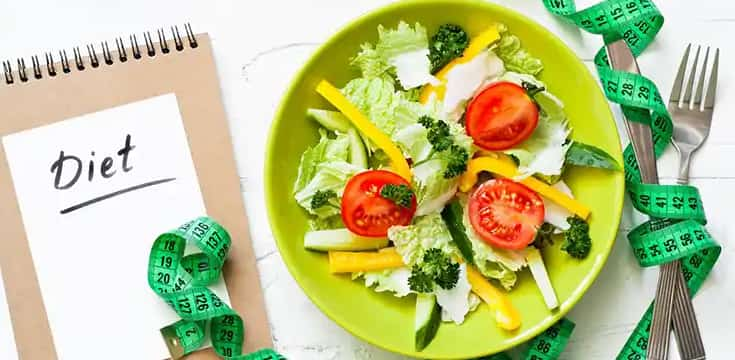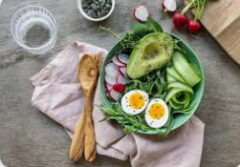Contents
We have officially entered those magnificent summer months when we are lively with the energy of the sun, the days are getting longer and the clothes are getting lighter. During this period, the thought “I should lose a few kilos” comes to the mind of many of us and we start searching for “crash diet that makes you lose 5 kilos in 3 days” on the internet. But wait! This summer, we completely forget about those unhealthy, unsustainable and unhappy diets.
Our aim is not to starve or disconnect from social life in order to lose a few kilos; on the contrary, it is to carry the energy, abundance and lightness of summer to our bodies. We will try to provide this with our “summer diet guide.”

Nutrition in the summer months is a subject that should be paid attention not only to losing weight, but also to maintain energy levels and ensure fluid-electrolyte balance. Instead of heavy meals, vegetables and fruits with high water content can be preferred to ease the digestive system. Especially seasonal fruits and vegetables such as melon, watermelon and cucumber are indispensable for summer diets.
In addition, as the time spent outside in the summer increases, the meal schedule may be disrupted or the risk of turning to ready-made foods may increase. At this point, a summer nutrition plan prepared with both practical and nutritious recipes comes into play. Light snacks, refreshing drinks and meals made with the right timing will keep your energy high throughout the summer.
In this guide, we will not discuss a list of prohibitions, but a “healthy summer diet and nutrition” philosophy that you can enjoy implementing and that will make you feel more vigorous, lighter and happier.

Summer Diet Water Rules and Refreshing Healthy Drinks
Let’s start with the first and most unshakable rule of summer diet and nutrition: Consuming enough water! With the increasing heat and humidity in the summer months, we lose much more water than usual through sweating. Dehydration not only causes headaches and fatigue, but also slows down our metabolism and even sends false hunger signals, pushing us to snack unnecessarily. That’s why that water bottle in your hand should be your best friend this summer.
We know the classic “drink 8-10 glasses of water a day” rule, but we can turn it from a chore into a pleasant habit. Get yourself a stylish water bottle that will motivate you. You can prepare a delicious and vitamin C-rich “detox water” by adding a few slices of lemon, cucumber, fresh mint leaves or fruits like strawberries to your water. Always keeping a jug or bottle of water on your desk or next to you is the easiest way to remember to drink water.
Did you know that you can provide hydration not only by drinking but also by eating? Many summer fruits and vegetables help to hydrate our bodies thanks to their high water content. Watermelon and cucumber top the list, which are more than 90% water. Foods like strawberries, cantaloupe, peaches, lettuce, and tomatoes are also delicious and great sources of water. Adding these water-rich foods to your meals will help support your body even when you forget to drink water.

The Importance of Consuming Sugar-Free Drinks!
Instead of attacking those sugary, acidic drinks or ready-made fruit juices to cool down in the summer, create your own healthy and refreshing alternatives. Green or white tea that you brew and cool without sugar is a great source of antioxidants. Ayran or cacık with plenty of mint both cools you down and provides probiotic support. Lemonade that you can sweeten with a little honey instead of refined sugar at home or a “smoothie” made with frozen fruits are also great options.
Finally, it is important to remember that some drinks make the body even more dehydrated. Especially alcohol and overly caffeinated drinks (coffee, some teas) have a diuretic effect, meaning they accelerate the excretion of water from the body. Of course, enjoy a cup of coffee, but especially in hot weather, limiting alcohol and caffeine consumption and compensating for this loss by drinking extra water afterwards would be a smart move to maintain your energy in the summer.
Lightening Summer Vegetables and Fruits: Nature’s Colors
Summer is the time when nature is most generous to us. That riot of colors on the counters, fresh and juicy vegetables and fruits are our greatest source of motivation for a healthy diet with a summer diet. It’s time to leave aside that heavy and root vegetable-based diet of winter and fill our tables with the abundance of summer! These foods are not only low in calories, but also rich in vitamins, minerals and fiber, keeping us full and increasing our energy.
Save salad from that boring “summer diet food” image and make it the star of your meals. A “summer salad” shouldn’t just consist of lettuce and tomatoes. Use your creativity! Add a protein source such as grilled chicken, fish, boiled chickpeas or some cheese on top of your green base to keep you full. Add avocado or a handful of walnuts/almonds to get healthy fats. You can also add a sweet and refreshing touch to your salad by adding peach slices, strawberries or watermelon pieces.
It’s impossible not to be captivated by the sweet charm of summer fruits. Watermelon, strawberries, cherries, peaches… They’re all great and healthy, but remember that fruits, even though they’re natural, still contain sugar (fructose). So portion control is important. Instead of sitting down and eating half a watermelon in one sitting, aim to consume 2-3 servings of fruit per day. Instead of eating fruit alone, it’s a much smarter choice to eat it with a protein source like a bowl of yogurt, a handful of almonds, or a piece of cheese to help balance your blood sugar.

The Rainbow Rule with Vegetables
Make those light and delicious vegetables, which are indispensable for summer tables, the centerpiece. You can create wonders with vegetables such as zucchini, eggplant, purslane, green beans, bell peppers. You can cook these vegetables in the oven or on the grill, make a light olive oil dish or turn them into a yogurt appetizer. Purslane, in particular, is both a great source of omega-3 and a perfect refreshing meal when combined with yogurt.
Apply the “rainbow rule” in your diet. In other words, try to include foods of every color on your plate. Different colors mean different vitamins, minerals and antioxidants. Red (tomatoes, watermelon, strawberries), green (cucumbers, purslane, mint), purple (eggplant, blackberries), yellow/orange (peaches, melons, peppers)… The more colorful your plate is, the more diverse nutrients you will take into your body. This appeals to both your eyes and your health.
Tips to Boost Your Energy in Summer
What we eat, as well as how we cook it, makes a big difference in summer nutrition. Deep fried foods, creamy sauces and pastries make digestion difficult in hot weather and cause us to feel heavy. Therefore, it is time to lighten up in the kitchen! By adopting lighter cooking methods, you will both preserve the nutritional value of your meals and feel much more energetic.
The most enjoyable cooking method in summer is undoubtedly grilling. Marinating vegetables, chicken or fish with a little olive oil and grilling them is both a delicious and extremely light option. In addition, methods such as boiling, steaming or cooking in their own juices in an oven bag will help you prepare healthy meals by minimizing the use of oil. Steaming vegetables in particular is one of the best methods that minimizes vitamin losses.
Put aside your heavy dinner habits consisting of the classic “soup-main course-rice” trio for the summer months. Keep your evening meals lighter and simpler. For example, a large bowl of protein salad can be a filling dinner on its own. You can create a balanced and light menu with a plate of green beans with olive oil, a slice of whole wheat bread and plenty of tzatziki. Instead of heavy meals, choose refreshing and easy-to-digest appetizer-style meals.

Blood Sugar Monitoring and Activities
Snacks are important to balance your blood sugar and prevent you from overeating at main meals. However, you should choose your snacks wisely. Instead of sugary snacks or packaged products, opt for healthy alternatives. Chopping a few strawberries into a bowl of yogurt, a handful of almonds or hazelnuts, sliced cucumbers or carrots, a glass of ayran… These will both keep you full and prevent energy drops during the day.
Finally, don’t forget to support your healthy diet with physical activity. Summer months offer great opportunities to move. A brisk walk, swimming or cycling in the early morning hours when the heat has faded or in the cool of the evening will speed up your metabolism and increase the effectiveness of your diet. Remember, healthy living is a whole and nutrition is only a part of this whole.
6 Techniques and Methods for Summer Diet
As you can see, the “summer diet” is not a process where you have to suffer, starve or eat tasteless food. On the contrary, it is a pleasant journey where we fill our tables with the fresh, colorful and delicious blessings that nature offers us, refresh ourselves by drinking plenty of water and feel more energetic with lighter cooking methods.
Do yourself a favor this summer and listen to your body. Instead of tiring it out with heavy, processed and unhealthy foods, feed it with the lightness of summer. The goal is not just how you look on the beach, but how you feel all summer long. Energetic, fit, happy and most importantly healthy…
Remember, the best diet is the one that is sustainable and enjoyable for you. I wish you to spend this summer feeling lighter both physically and mentally by adapting the tips in this guide to your own lifestyle. Enjoy your meal in advance and have a wonderful summer!
Please do not approach the subject as just losing weight. Health comes first and is very important. When it comes to summer, prepare a travel bag and a holiday budget.
Now, in order to itemize and summarize the topic, we list 6 tips for summer diet and healthy nutrition:
- Prefer Seasonal Vegetables and Fruits: Foods with high water content such as cucumber, tomato, zucchini, watermelon both keep you full and cool.
- Increase Daily Water Consumption: Make sure to drink at least 2-2.5 liters of water a day to replace the fluid lost through sweating in hot weather.
- Keep Your Meal Times Regular: A balanced nutrition plan supported by snacks keeps your metabolism active and prevents sudden hunger pangs.
- Pay Attention to Portion Control: Prefer to eat little but often. Eat in moderation by preparing small portions instead of large plates.
- Avoid Fried and Overly Fatty Foods: These types of foods make digestion difficult in the summer months, tire the stomach, and increase the feeling of discomfort in hot weather.
- Use Natural Alternatives Instead of Sugary Drinks: Instead of ready-made fruit juices and sodas, prefer homemade lemonade, detox waters, or cold herbal teas.
